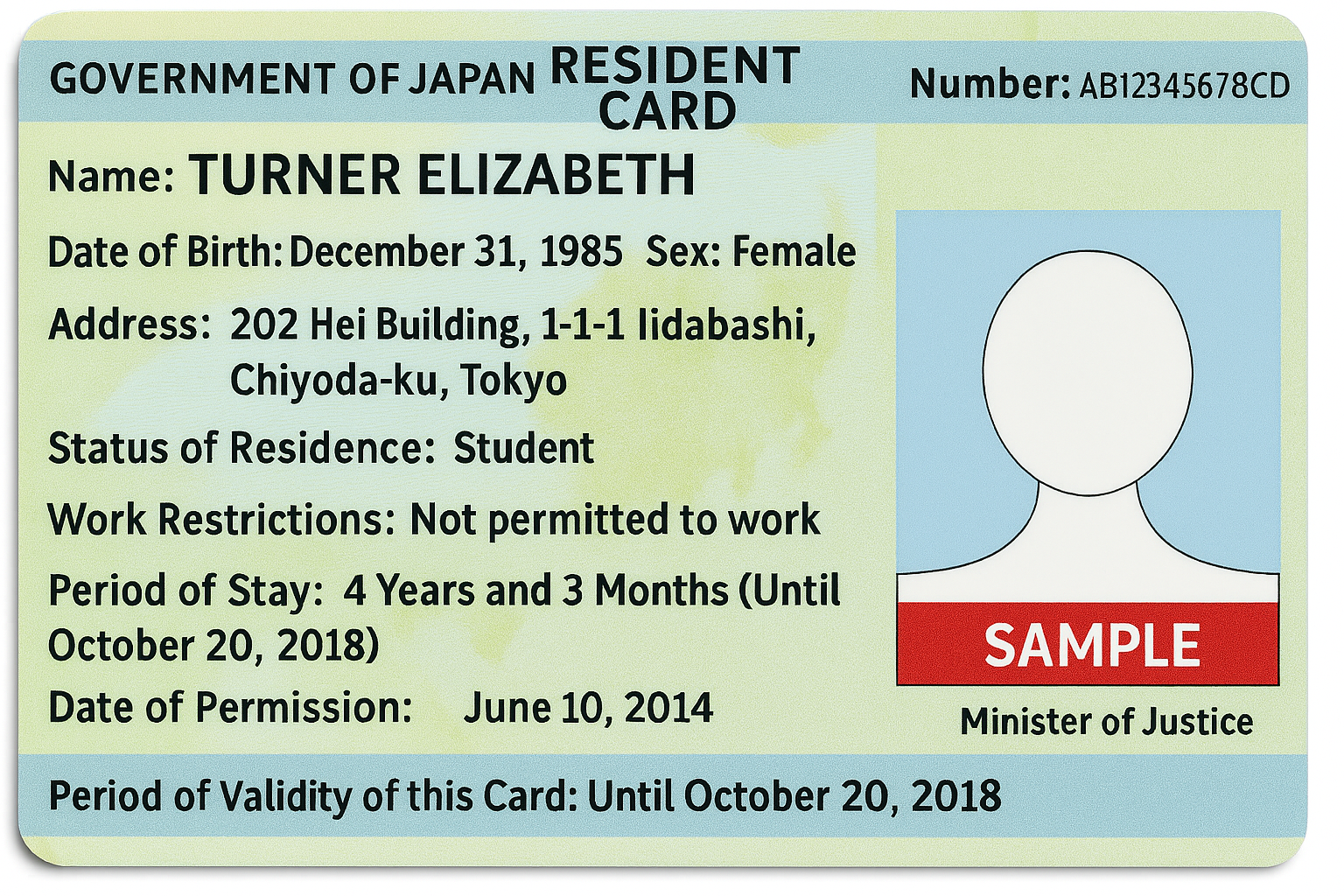Reviewed by: Yuki Ando, Certified Immigration Legal Specialist (Gyoseishoshi)
This article provides a detailed explanation of the Residence Card system and the related administrative procedures required for all mid- to long-term residents in Japan (excluding diplomats, officials, and certain designated activities).
Table of Contents
What Is a Residence Card?
 A Residence Card is an official identification document issued to foreign nationals residing in Japan. It contains important personal and legal information such as the individual’s residence status, period of stay, full name, date of birth, and residential address. Additionally, the card serves as a certificate of permission, verifying the approvals granted through immigration inspections and various residence status applications.
A Residence Card is an official identification document issued to foreign nationals residing in Japan. It contains important personal and legal information such as the individual’s residence status, period of stay, full name, date of birth, and residential address. Additionally, the card serves as a certificate of permission, verifying the approvals granted through immigration inspections and various residence status applications.To put it simply, a Residence Card is similar to a driver’s license. Just as carrying a driver’s license is required when operating a vehicle on public roads in Japan, mid- to long-term residents are legally obligated to carry their Residence Card at all times.
Foreign nationals staying in Japan for a short-term visit are not issued a Residence Card and must instead carry their passport at all times.
Details Listed on the Residence Card
 The Residence Card has both a front and a back side, each containing specific essential information as outlined below.
The Residence Card has both a front and a back side, each containing specific essential information as outlined below.
Information Listed on the Front Side
Information Listed on the Back Side
If You Hold Multiple Nationalities
If a person holds more than one nationality, only one country or region will be listed in the “Nationality/Region” section of the Residence Card.When a foreign national newly enters Japan and becomes a mid- to long-term resident, the country or region that issued the passport bearing the immigration landing permission will be recorded. If the individual is already residing in Japan as a mid- to long-term resident and receives a new Residence Card, the country or region listed on the previous card will be carried over to the new one.
In cases where a person staying in Japan on a short-term visa later changes to a mid- to long-term status of residence, the country that issued the passport submitted during the status change application will be listed on the Residence Card. Similarly, for individuals who become mid- to long-term residents through refugee recognition or as persons granted complementary protection, the country name listed on the refugee recognition certificate or the certificate of complementary protection will be recorded on the Residence Card.
Requesting the Use of Kanji Characters in the Name Field
By default, names on a Residence Card are written in Roman letters. However, it is possible to request the use of kanji characters by submitting a Kanji Name Representation Request during procedures such as applying for a residence status or reissuing a Residence Card. To be eligible, applicants must provide documentation proving that kanji characters are officially used for their name in their home country. Therefore, not everyone is allowed to use kanji on their Residence Card.There is no fee for this request if it is submitted together with an application for residence status or a notification of changes to information other than the residential address. However, if the kanji name representation request is made on its own, it will be treated as a voluntary reissuance request for the Residence Card, and a fee of ¥1,600 will apply.
Only standard kanji characters officially designated by the Ministry of Justice can be used on the Residence Card. Simplified or non-standard characters not recognized as official may need to be replaced with their proper equivalents, which means that some kanji used in the applicant’s home country may not be accepted.
Residence Statuses Eligible for a Residence Card
 A Residence Card is not issued to all foreign nationals residing in Japan. It is granted only to those who hold a valid status of residence, with the exception of individuals who fall under the following categories:
A Residence Card is not issued to all foreign nationals residing in Japan. It is granted only to those who hold a valid status of residence, with the exception of individuals who fall under the following categories:Obligation to Carry and Present the Residence Card
 Foreign nationals who have been issued a Residence Card are required by law to carry it with them at all times. Therefore, if an employer or staff member at a company temporarily holds the Residence Card on behalf of the foreign national—for example, when assisting with a status of residence application—they must provide both a copy of the front and back of the card along with a receipt, in order to avoid a violation of the carry obligation.
Foreign nationals who have been issued a Residence Card are required by law to carry it with them at all times. Therefore, if an employer or staff member at a company temporarily holds the Residence Card on behalf of the foreign national—for example, when assisting with a status of residence application—they must provide both a copy of the front and back of the card along with a receipt, in order to avoid a violation of the carry obligation.\*Note: Foreign nationals under the age of 16 are not required to carry a Residence Card.
In addition, if a government or local public authority official requests presentation of the Residence Card as part of their official duties, the cardholder must comply. The officials authorized to request presentation of the Residence Card are as follows:
Officials authorized to request presentation of a Residence Card:
Procedures for Changing Address and Other Recorded Information
 If any of the information listed on a Residence Card changes, the cardholder must notify the Director General of the Immigration Services Agency of Japan. Since the procedures differ depending on whether the change involves the residential address or other recorded details, each case will be explained separately below.
If any of the information listed on a Residence Card changes, the cardholder must notify the Director General of the Immigration Services Agency of Japan. Since the procedures differ depending on whether the change involves the residential address or other recorded details, each case will be explained separately below.
When You Become a New Mid- to Long-Term Resident
Foreign nationals who have been granted entry into Japan and acquire mid- to long-term resident status must report their residential address to the municipal office within 14 days of deciding on a place to live. During this process, they must present their Residence Card, and once the procedure is completed, the card will be returned with the address officially recorded. Although this report is made under the Basic Resident Registration Act, completing it at the municipal office is considered sufficient to fulfill the reporting obligation to immigration authorities as well.Even if the individual originally held a status of residence that does not qualify for a Residence Card—such as a short-term stay—but later changes to a mid- to long-term status through a status change application, they must also report their address to the municipal office within 14 days of determining their residence. If the residence was already determined before the change of status was approved, the report must be submitted within 14 days from the approval date.
Procedure for Changing the Address on a Residence Card
If a mid- to long-term resident who continues to stay in Japan decides on a new place of residence, they must notify the municipal office within 14 days of moving to the new address. During the procedure, the individual must present their Residence Card, which will be returned with the updated address once the process is completed. This notification is made under the Basic Resident Registration Act; however, by submitting it at the municipal office, the individual is also considered to have fulfilled the reporting obligation to the Immigration Services Agency.Procedure for Changing Information Other Than Address on the Residence Card
If you need to change any information on your Residence Card other than your residential address, you must notify the local Immigration Services office (regional office, branch office, or sub-branch) within 14 days of the change. The required documents will vary depending on the type of information being updated. Please note that when submitting your notification at the immigration counter, you must present both your Residence Card and your passport.Reissuance Procedures for Lost or Damaged Residence Cards
 Since Residence Cards must be carried regularly and used in various situations, there is always a possibility that the card may become lost or damaged. Below are the appropriate procedures for each case.
Since Residence Cards must be carried regularly and used in various situations, there is always a possibility that the card may become lost or damaged. Below are the appropriate procedures for each case.
Application for Reissuance in Case of Loss
If a foreign national who has been issued a Residence Card loses possession of it due to loss, theft, or destruction, they must apply for reissuance within 14 days from the date they became aware of the incident. The application must be submitted to the regional Immigration Services office (main office, branch, or sub-branch) that has jurisdiction over the applicant’s place of residence.Application for Reissuance in Case of Damage
Foreign nationals who have been issued a Residence Card may apply for a replacement if the card becomes stained, physically damaged, or if the embedded electronic data is compromised. This procedure is optional, not mandatory, so there is no fixed deadline for submitting the application. However, if the immigration authorities issue an official order to apply for reissuance, the individual must complete the application within 14 days of receiving the order.Procedure for Renewing the Validity Period of a Residence Card
 The validity period of a Residence Card varies depending on the type of residence status and the individual’s age. It is determined according to the following four categories:
The validity period of a Residence Card varies depending on the type of residence status and the individual’s age. It is determined according to the following four categories:Timing for Renewal
If the validity period of the Residence Card coincides with the expiration date of the period of stay, no special procedure is required. By applying for an extension of the period of stay, the validity of the Residence Card will also be automatically extended. If the period of stay expires while the extension application is under review, the applicant is allowed to continue engaging in activities under the current status during a special grace period, which lasts until either a decision is made or two months have passed since the original expiration date—whichever comes first. During this special period, the Residence Card’s validity is also automatically extended.Foreign nationals residing in Japan with Permanent Resident status, Highly Skilled Professional (ii) status, or those whose Residence Card expires the day before their 16th birthday, must apply to renew the card’s validity between two months prior to the expiration date and the expiration date itself. The application must be submitted to the regional Immigration Services office (main office, branch, or sub-branch) that has jurisdiction over their place of residence.
If a Permanent Resident Forgets to Renew Their Residence Card
If a foreign national with Permanent Resident status or Highly Skilled Professional (ii) status forgets to renew their Residence Card, they should promptly submit a renewal application at the regional Immigration Services office (main office, branch, or sub-branch). Although there is a validity period for the Residence Card, these statuses do not have a fixed period of stay, so forgetting to renew the card does not result in overstay or illegal residence. However, renewing the Residence Card is a legal obligation under the Immigration Control Act, so once the oversight is noticed, the renewal procedure must be completed without delay.Fees for Residence Card Renewal and Reissuance Applications

Violations Related to the Residence Card
 Violating the rules related to the Residence Card may result in deportation procedures or criminal penalties. Deportation is an administrative measure that forcibly removes a foreign national from Japan if they meet certain grounds for removal under immigration law.
Violating the rules related to the Residence Card may result in deportation procedures or criminal penalties. Deportation is an administrative measure that forcibly removes a foreign national from Japan if they meet certain grounds for removal under immigration law.
Deportation Order
If a person commits an illegal act related to their Residence Card, they may be subject to a deportation order not through a “Departure Order” but through “Forced Deportation” from Japan. Whether the individual will be detained or placed under supervision is determined by the supervising immigration officer following a review.Grounds for Deportation Related to the Residence Card:
Penal Provisions Under the Immigration Control Act
The following are the penal provisions under the Immigration Control Act related to Residence Cards:About Residence Card Forgery
 When a company or organization hires a foreign national, there are significant risks if the Residence Card presented by the individual is a forgery. Employing a foreign national who holds a status of residence that does not permit work, or someone who is residing in Japan illegally, may result in the employer being unable to receive future permissions to hire foreign workers. Additionally, the employer may face criminal charges for promoting unauthorized employment.
When a company or organization hires a foreign national, there are significant risks if the Residence Card presented by the individual is a forgery. Employing a foreign national who holds a status of residence that does not permit work, or someone who is residing in Japan illegally, may result in the employer being unable to receive future permissions to hire foreign workers. Additionally, the employer may face criminal charges for promoting unauthorized employment. To avoid inadvertently becoming involved in illegal employment, it is essential to verify the authenticity of the Residence Card. Below are three methods for checking for forgery.
Inquiry on Expired Residence Card Number Information
The Residence Card Number Expiration Information Inquiry is a website operated by the Immigration Services Agency that allows users to verify whether a residence card is valid by entering the card number and its expiration date. By using this system, you can identify residence cards that have expired or those with non-existent numbers or expiration dates.However, please note that this tool cannot detect forged residence cards that are created by copying real and valid cards.
Immigration Services Agency|Residence Card Number Expiration Information Inquiry
(URL:https://lapse-immi.moj.go.jp/ZEC/appl/e0/ZEC2/pages/FZECST011.aspx)
Anti-Counterfeiting Measures such as Holograms
Residence cards are equipped with anti-counterfeiting features such as holograms displaying the letters “MOJ” (an abbreviation for Ministry of Justice) and color-shifting elements to prevent forgery or alteration.Immigration Services Agency|Guide to “Residence Cards” and “Special Permanent Resident Certificates”
(URL:https://www.moj.go.jp/isa/content/930001578.pdf)
Residence Card Reader Application
The Residence Card Reader Application was released in 2020 to address the increasing sophistication of forged residence cards. This application is available for free on both PC and smartphone platforms—Windows and macOS for PCs, and Android and iOS for smartphones.To use the PC version, a dedicated card reader/writer is required to scan the residence card. For smartphones, an NFC-enabled device is necessary to read the card’s embedded data.
Immigration Services Agency of Japan|Residence Card Reader Application Support Page (URL:https://www.moj.go.jp/isa/applications/procedures/rcc-support.html)
Summary
This article has explained the key aspects of the residence card system, including its legal framework, notification procedures, and obligations related to residence cards. A residence card serves as a visual representation of a foreign national’s residency status—a legal concept that defines the permitted activities a foreigner can engage in while in Japan.When hiring a foreign national, it is essential to carefully verify the details on their residence card and ensure that their designated status of residence aligns with the intended job responsibilities before entering into an employment contract. Furthermore, for continued employment, employers must always keep up to date with each employee’s period of stay and type of residence status.
We hope this article has provided helpful guidance for companies considering the hiring of foreign personnel.
This article is a translation of the original Japanese version.














